Mental Health App Development is important.
You see, mental health is one of the most neglected part of our lives.
Consequently, every 1 in 5 U.S Adult is suffering from mental illness. In addition to this, 1 in 20 U.S. adults are suffering from serious mental issues each year.
50% of all lifetime mental illness begins by age 14, and 75% by age 24.These stats are alarming.
Even though various government bodies and other organization are working round the clock to help the needy, it’s just not possible to reach everyone.
Well, that has just changed with the introduction of technology in field of healthcare, giving rise to mental health apps. And in this blog, we shall be discussing mental health app development to the fullest.
By the end of the blog, you will have all you need to know to create an mental health app. Therefore, with this being said, let’s get right into it:
Introduction To Mental Health App Development
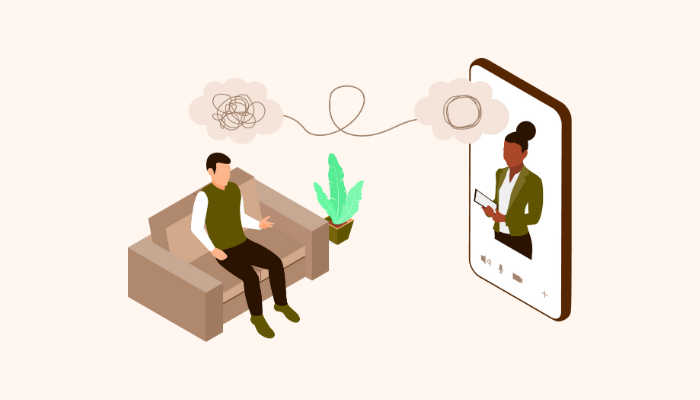
What is mental health app development?
As the name suggests, this is a form of healthcare app development that is entirely focused around mental health.
Now, the specification of app’s working and what it offers are based on the type of mental heath app. After all, the entire industry can be divided into lots of different niches.
Speaking of which, we shall be going through the different types of mental health app development solutions in the section below:
Types of Mental Health App
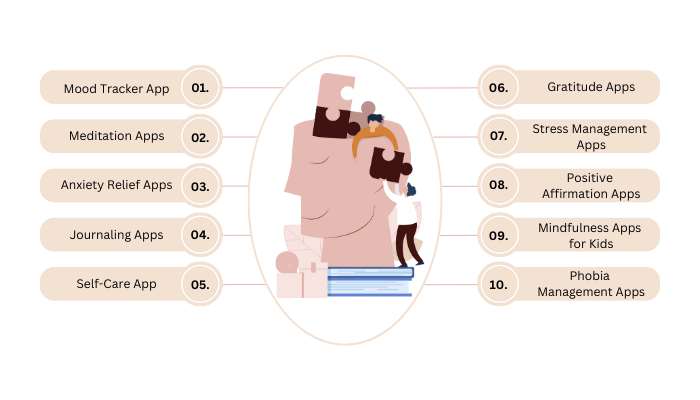
Want to develop a mental health app? the first thing you need to do Is decide which type.
Therefore, in this section of the blog, we shall be going through the different types of mental health apps. These are, as mentioned below:
- Mood Tracker App
- Meditation Apps
- Anxiety Relief Apps
- Journaling Apps
- Self-Care App
- Sleep Improvement Apps
- Crisis Helpline Apps
- Cognitive Training Apps
- Therapy and Counseling Apps
- Gratitude Apps
- Stress Management Apps
- Positive Affirmation Apps
- Mindfulness Apps for Kids
- Phobia Management Apps
Now that we are done with the different types of mental health app development, let’s move to the next section.
Do People Actually Need Mental Health Apps?
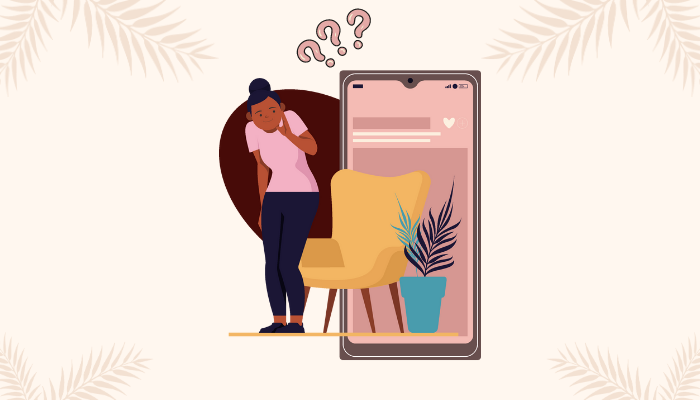
Yes, people absolutely need mental health apps, and as an entrepreneur, your role in creating these apps is crucial.
Mental health apps provide accessible and convenient support to users who are seeking assistance with their emotional well-being. Your apps can be invaluable tools for individuals dealing with stress, anxiety, depression, and other mental health challenges.
With mental health app development, you’re offering users a safe space to track their moods, practice mindfulness, and engage in therapeutic exercises.
These apps cater to the modern lifestyle, allowing users to seek help discreetly and at their own pace. Your efforts contribute to breaking down barriers that may prevent individuals from seeking traditional mental health support.
Remember that your app’s impact goes beyond providing features. You’re creating a digital platform that empowers users to take control of their mental health journey. By incorporating evidence-based practices and collaborating with mental health experts, you’re ensuring the credibility and effectiveness of your app.
Your dedication to Mental Health App Development can make a real difference in people’s lives. The positive feedback and success stories from users will reaffirm the importance of your work.
So, keep in mind that your contributions as an app developer play a significant role in improving the mental well-being of countless individuals worldwide. And embrace this opportunity to make a positive impact and support those in need through your innovative and compassionate app development.
Popular Mental Health Apps For Inspiration
As you go down the path of mental health app development, seeking inspiration from popular apps can guide your efforts.
Take a look at these widely acclaimed mental health apps that have garnered immense popularity among users:
Headspace
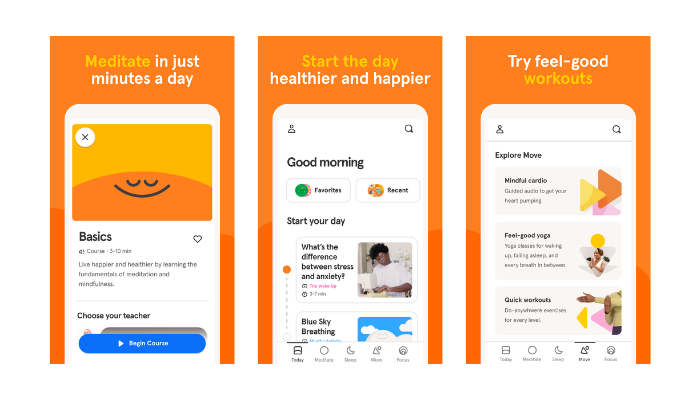
Explore Headspace, a renowned meditation app that offers guided meditation sessions to reduce stress, improve focus, and cultivate mindfulness.
Take inspiration from its simple and user-friendly interface, along with its diverse range of meditation themes catering to different user needs.
Calm
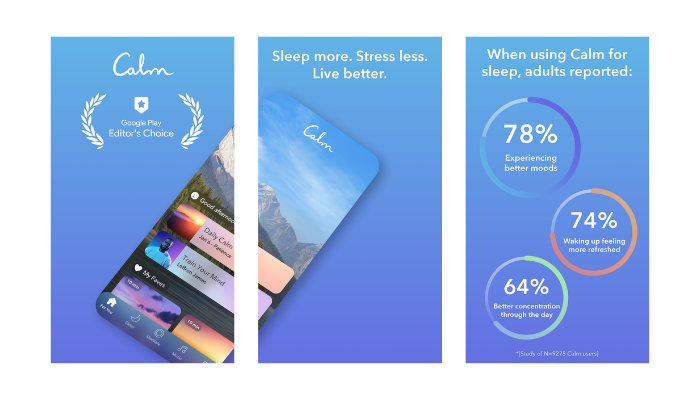
Discover Calm, an app known for its soothing sounds and sleep improvement features. In fact, there are 1000s of people who want to build an app like calm.
Here, you can draw inspiration from its calming ambiance and the variety of relaxation exercises it provides, helping users achieve better rest and relaxation.
Moodpath

Study Moodpath, an app that uses mood tracking and questionnaires to assess users’ mental well-being.
Here, you can gain insights into its personalized recommendations and user-friendly design, allowing users to navigate their emotional journey effectively.
Talkspace
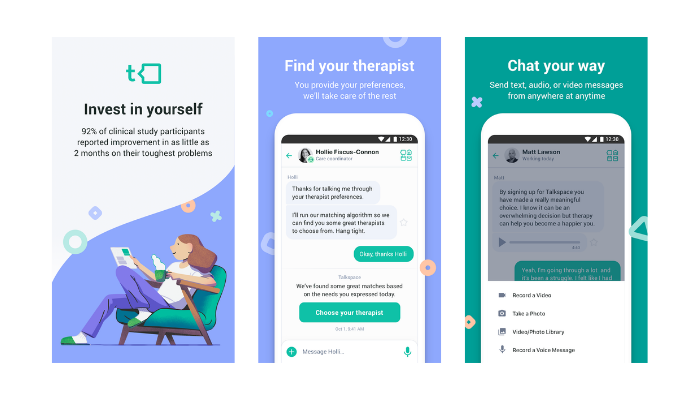
Talkspace, a platform connecting users with licensed therapists through messaging or video sessions.
It is quite a popular mental health app and you can take note of how it provides virtual counseling and support, bridging the gap between users and mental health professionals.
Happify
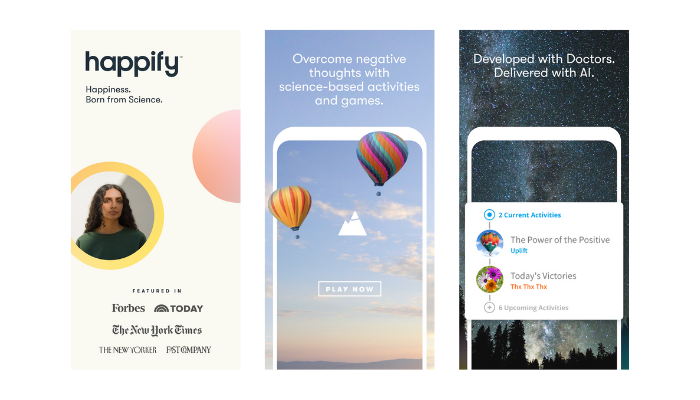
Lastly, you can benefit if you examine Happify’s approach to boosting happiness and reducing stress.
And observe its use of science-based activities and games, which can be a source of inspiration for adding engaging and evidence-based content to your app.
By analyzing these popular mental health apps, you can draw valuable insights on user preferences, app features, and user interface design.
Combine these learnings with your unique ideas and vision to develop an impactful mental health app that resonates with users and contributes positively to their well-being.
Essential Features For Mental Health App Development
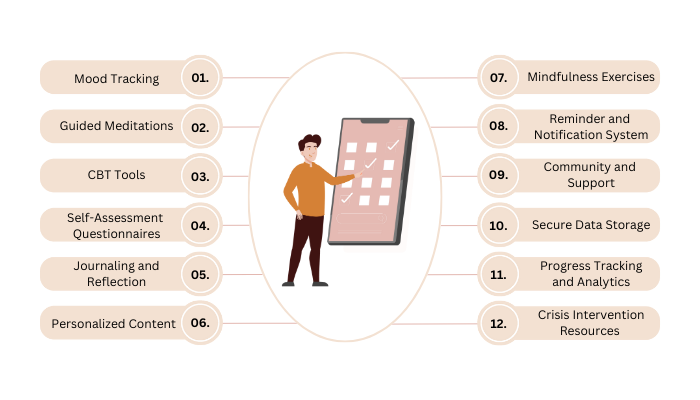
Now if you want to develop a healthcare app for people suffering with mental illness or are at risk of, it’s important to include right features.
In other words, as you delve into the Mental Health App Development, make sure to include these essential features to create a comprehensive and user-friendly platform:
- Mood Tracking
- Guided Meditations
- Cognitive Behavioral Therapy (CBT) Tools
- Self-Assessment Questionnaires
- Journaling and Reflection
- Personalized Content
- Mindfulness Exercises
- Reminder and Notification System
- Community and Support
- Secure Data Storage
- Progress Tracking and Analytics
- Crisis Intervention Resources
By incorporating these essential features into your mental health app, you’ll create a powerful tool that empowers you on your well-being journey.
Remember to validate the app’s features with mental health professionals to ensure they align with evidence-based practices and genuinely enhance your mental health and overall well-being.
How To Develop A Mental Health App?
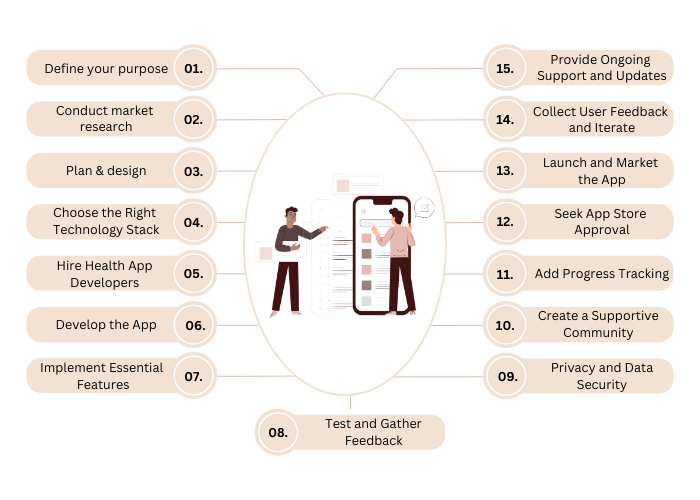
Mental Health App Development can be a rewarding experience, being one of the top healthcare app ideas.
Therefore, let’s see how you can convert this idea to reality in the detailed process below:
1. Define Your Purpose
Start by identifying the primary goal of your mental health app.
Determine the specific mental health concerns you aim to address and the target audience you want to cater to.
2. Conduct Market Research
Research existing mental health apps to understand their strengths and weaknesses. It is very important for the entire mental health app development process.
Moreover, analyze user reviews and feedback to identify gaps in the market that your app can fill.
3. Plan and Design
Create a detailed plan for your app’s development.
Outline the app’s features, user interface, and user experience. Design wireframes and mockups to visualize the app’s layout and flow.
4. Choose the Right Technology Stack
Select the appropriate programming languages, frameworks, and databases for your app.
Consider factors like platform compatibility (iOS, Android, or both) and scalability.
5. Hire Health App Developers
It’s time to hire mobile app developers.
Partner with mental health experts to validate your app’s content and ensure it adheres to evidence-based practices. Their insights will enhance the credibility of your app.
6. Develop the App
This is the part where App Developers begin coding the app based on your design and technology stack choices. Focus on creating a user-friendly interface and a seamless user experience.
7. Test and Gather Feedback
Conduct thorough testing to identify and fix any bugs or issues.
Seek feedback from potential users and mental health professionals to make necessary improvements.
8. Privacy and Data Security
Prioritize user privacy and data security by implementing strong encryption and secure authentication mechanisms.
9. Create a Supportive Community
Consider integrating a community feature where users can connect, share experiences, and provide support to one another.
10. Add Progress Tracking
Allow users to track their mental health progress over time using visualizations and analytics. Celebrate their growth and motivate them to continue using the app.
11. Seek App Store Approval
Prepare your app for submission to app stores (Apple App Store, Google Play Store). Follow their guidelines and requirements for a smooth approval process.
12. Launch and Market the App
Once approved, launch your mental health app and focus on marketing efforts.
Use social media, content marketing, and collaborations with mental health organizations to reach your target audience.
Remember, developing a mental health app requires compassion and responsibility. Prioritize the well-being of your users and aim to make a positive impact on their lives through your app’s features and content.
Mental Health App Development Cost
As you venture into mental health app development, the cost will vary based on several factors.
The complexity of features, platform compatibility (iOS, Android, or both), development team size, and ongoing maintenance are key determinants.
A basic app may healthcare app development cost around $20,000 to $50,000, while more advanced apps can range from $100,000 to $500,000 or more.
Remember to allocate budget for continuous updates and customer support after the initial launch. Plan your finances wisely to create a successful and impactful mental health app.
Conclusion
This is all you need to know about mental helath app development. And with this out of the way, it’s time for you to contact a market leading mobile app development company and work with them to create your own version.
FAQ
Mental health apps address the growing need for accessible and convenient support. They offer users tools for stress management, self-care, and tracking emotions, ultimately promoting better mental well-being.
Key features include mood tracking, meditation exercises, symptom assessment, secure data storage, mindfulness techniques, personalized content, reminders, and progress analytics.
Implement data encryption, secure authentication, and compliance with data protection regulations (e.g., GDPR, HIPAA). Regular security audits and anonymization of data are crucial.
Choose a scalable backend (e.g., Node.js, Ruby on Rails), a reliable database (e.g., PostgreSQL, MongoDB), and platform-specific tools like Swift for iOS and Kotlin for Android.
Keep the interface simple, intuitive, and visually appealing. Conduct user testing to identify pain points and optimize navigation.
Yes, gamification can enhance user engagement. Implement achievements, progress badges, and challenges to motivate users on their mental health journey.
Inclusion of mental health professionals is beneficial for content validation, offering therapy sessions, and ensuring the app aligns with evidence-based practices.
Consider freemium models, subscription plans, in-app purchases for premium content, or partnerships with mental health services for referral commissions.
Yes, providing crisis helplines and emergency resources is crucial. Include access to professional help and hotlines for immediate support.
Utilize social media, app store optimization, influencer partnerships, content marketing, and collaborations with mental health organizations to reach the target audience.

Yashshree Purohit, an experienced Technical Content Writer at Nimble AppGenie boasts over 5 years of expertise crafting compelling content across multiple domains. Passionate about transforming complex ideas into clear and compelling narratives, she excels in creating content that resonates with the audience.
Table of Contents








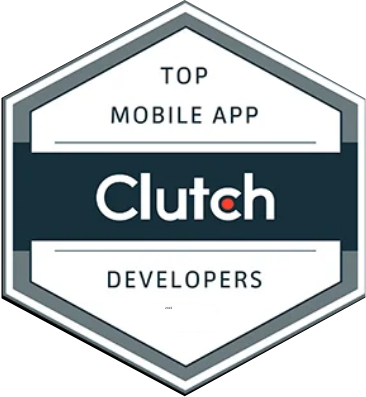
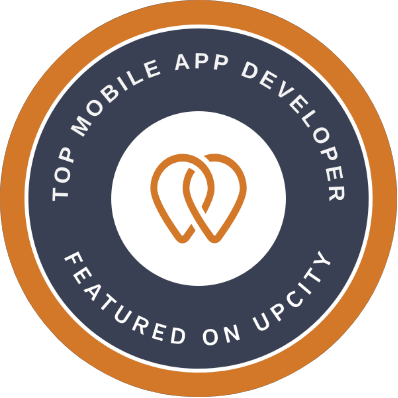
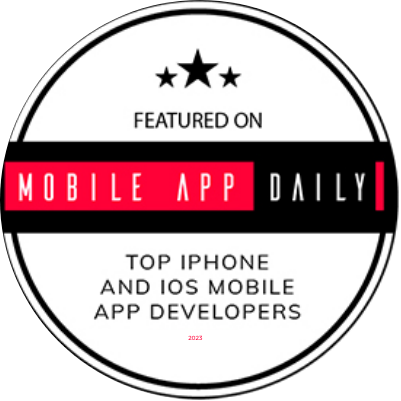
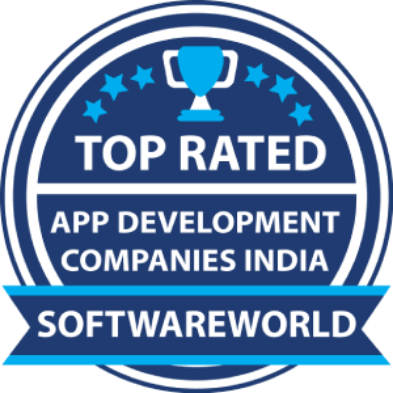
No Comments
Comments are closed.